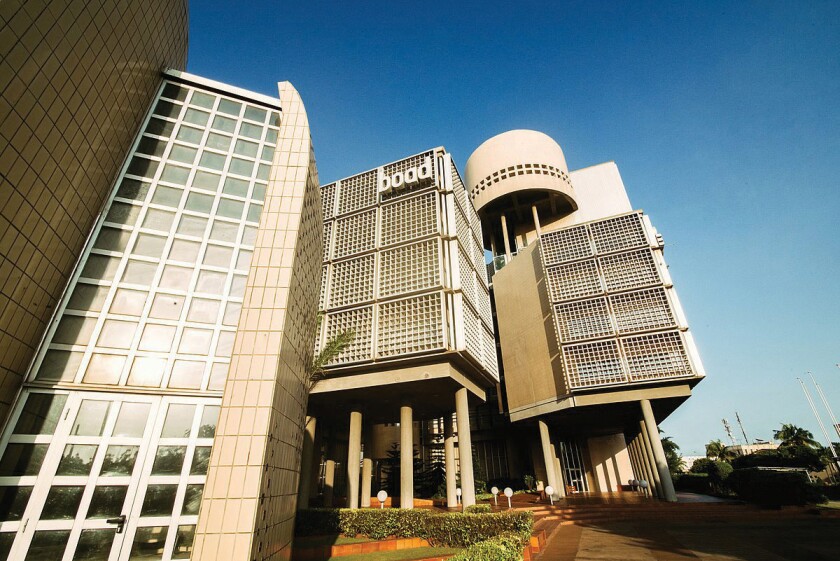A new chapter in finance for development banks — both national and supranational — could be opening, with the beginning of subordinated debt issuance. There are plenty of factors that could make this slow to develop, but it offers a chance for these banks to support their ratings and possibly even make their scarce capital go further.
Last week Banque Ouest Africaine de Développement (BOAD), the regional development bank of the West African Economic and Monetary Union, began talking to investors about a planned $500m subordinated bond issue.
Junior debt, which would absorb losses before senior debt, is another avenue for development banks to pursue in making their capital structures more efficient, alongside techniques such as securitization and risk sharing.
The African Development Bank attracted widespread notice in 2018 by executing a $1bn synthetic securitization of about 40 loans, to free up capital for new lending.
Earlier, in 2015, the AfDB, Inter-American Development Bank and World Bank each transferred $4.5bn of sovereign loan risk to the other two, and took on the same amount of their risk, so as to improve the diversity of their loan books, which supports their ratings.
But adoption of such techniques has been slow, partly because of the highly political nature of their governance.
Subordinated debt would be another way to strengthen development banks’ balance sheets: by raising risk-bearing capital from private sector investors, to complement the equity they receive from their government shareholders, most of which is not paid in but callable if they should ever need it.
BOAD’s bond has some similarities with corporate hybrid capital issues. It will have a 60.75 year, non-call 5.75 year maturity. After that 5.75 year point, its interest rate will reset every five years if it is not called, with a 100bp coupon step-up after 10 years.
JP Morgan (development finance structuring agent) and HSBC are bookrunners on the deal, set to be rated Ba1 by Moody’s.
The deal is not the only project of its kind among supranationals, sovereigns and agencies, although very few have surfaced publicly.
A banker at an investment bank away from the BOAD deal said other SSAs, including MDBs, would issue subordinated debt — including issuers that were less “heavily emerging market” than BOAD.
Blueprint
“Structure-wise, [BOAD] does showcase the blueprint for the future,” he said. Development banks “are starting to do them. It won’t be an avalanche but just a new … asset class slowly developing over time.”
The head of debt capital markets at another firm said he knew one investment bank had been talking to issuers about this at least four years ago.
Sub debt could work when a supranational’s rating was held down by weak ratings of some of its shareholders, he said.
The first banker off the deal said “In terms of features… these are more like [financial institution] instruments such as [insurance companies’ restricted tier one and banks’ additional tier one capital] than corporate hybrids.”
Moody’s and Fitch, which rate BOAD Baa1/BBB, are giving significantly more equity credit to this structure than the standard 50% for corporate hybrids.
Moody’s said on Monday that it expected to give it 75% equity credit. This could be particularly valuable to BOAD, as Moody’s has it on review for downgrade, partly because of fighting in Mali, which has made it difficult for Malian borrowers to repay their loans.
The subordinated bond has not persuaded Moody’s to lift the review for downgrade, but it will weigh in the rating agency’s calculations.
The bond’s rating three notches below BOAD’s senior debt reflects its long maturity and the fact that it is senior only to equity. BOAD can choose to stop interest payments on it at any time, and must do so if its equity to assets ratio falls below 18%. BOAD would not later make up any skipped interest payments. It also cannot issue preferred shares that would rank junior to the sub debt.
A spokesperson for Moody’s told GlobalMarkets: “Several supranational entities have subordinated debt facilities in place, including [infrastructure funding organisation] GuarantCo, which has a subordinated facility from… Agence Française de Développement. The Currency Exchange Fund (TCX), which we also rate under the MDB methodology, has subordinated convertible loans from several governments.”
The official said Moody’s had developed criteria for assessing hybrid capital issued by MDBs in 2020, because it expected to see more of them being issued. “While we broadly follow the approach that Moody’s adopts for corporate hybrids, we pay close attention to who provides the funding, the final maturity and the triggers for coupon and/or repayment suspension.”
